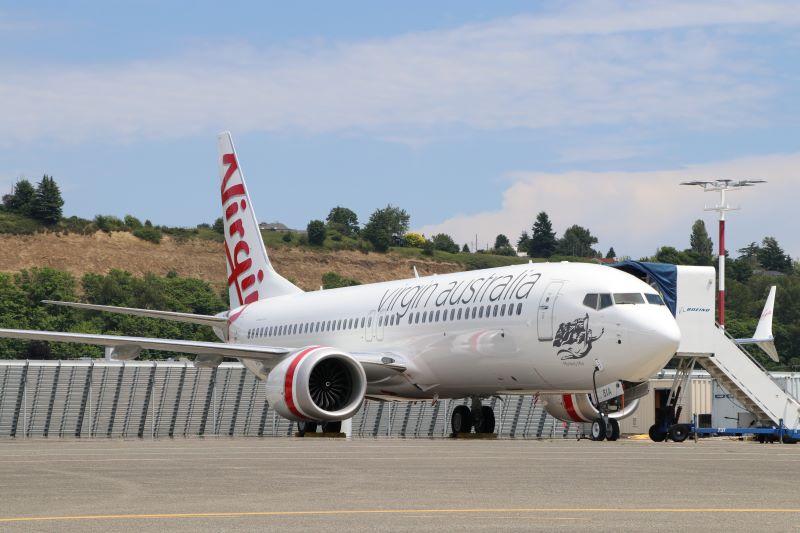Daily Memo: Major Changes Underway In Australia’s Narrowbody Sector

The transformation of Australia’s narrowbody fleet is taking major steps forward in 2023, as airlines take delivery of additional aircraft and introduce important new types.
Australian airlines dramatically revised their fleet strategies during the COVID-19 crisis, overhauling existing order agreements and making new purchase deals. These plans are starting to come to fruition as more aircraft enter service, and others are due to start arriving soon.
Virgin Australia is a prime example of an airline introducing new variants. The carrier took delivery of its first Boeing 737-8 on June 28, from its orders for 33 737 MAX-family aircraft. These comprise eight -8s, and 25 of the larger -10 version that are due to arrive starting in 2024. While the airline ordered the MAXs before the pandemic, it tweaked the order in December 2020.
The initial MAX aircraft has been deployed on Virgin’s recently-added route from Cairns to Tokyo—which is significant as it marks the airline’s return to long-haul international flying after the pandemic.
Virgin had planned to use 737-8s to launch the Tokyo route, but delays meant the flight was operated briefly using a 737-700. The range, payload, and efficiency of the -8 makes it a far better proposition for this route than the older -700.
The use of the MAX on the Tokyo route showcases the additional flexibility the aircraft will give Virgin as more are delivered over the next five years.
However, Virgin was not the first to operate 737 MAXs in Australia—that honor went to start-up LCC Bonza, which launched domestic flights with a fleet of three 737-8s in January. It has since taken delivery of a fourth -8 and has plans to add more.
Regional Express (Rex) is another Australian carrier that made major fleet changes during the pandemic period. The airline decided to add 737-800s to its large turboprop fleet, partly to take advantage of the market opportunity afforded by Virgin’s temporary retreat.
Rex has steadily built its narrowbody jet fleet to seven 737s, and in July it signed a lease deal to add two more. One has arrived and is due to enter service in mid-August, while the second is scheduled for delivery in September. Further growth could be coming—the airline says it may add another two 737s before mid-2024.
The introduction of the 737s has allowed Rex to branch out from its regional operations to compete with the larger carriers on trunk routes between Australia’s largest east coast cities.
Qantas has put plans in place for a sweeping overhaul of its narrowbody fleet. In May 2022, the carrier placed orders for 40 Airbus narrowbody aircraft to start the replacement of its domestic fleet, with purchase rights for another 94. It has already converted some of the purchase rights into nine more firm orders.
Combined with its existing orders earmarked for subsidiary Jetstar, the Qantas Group now has nearly 300 narrowbodies in its order backlog, including purchase rights.
The latest tranche of firm orders includes 29 A220s; these will be the first of the new Qantas aircraft to arrive. The initial A220 is already under construction in Mirabel, Canada, and it is expected to be delivered in late 2023 for entry into service in early 2024.
Qantas will use the A220s to replace its veteran Boeing 717 jets, mainly on domestic routes from smaller cities such as Canberra and Hobart to major hubs in Brisbane, Melbourne, and Sydney. Because the A220s have almost double the range of the 717s, they can also be employed on some short-haul international routes, Qantas said. The carrier expects to have seven A220s in service by the end of 2024, and all 29 by 2027. The first of the 717s was retired in June.
Qantas’ narrowbody firm orders also include 20 A321XLRs, which are due to begin replacing its domestic 737-800s starting in late 2024.
Meanwhile, Qantas’ subsidiary LCC Jetstar has been introducing A321LRs to its narrowbody fleet since the pandemic, with the added range of these aircraft giving the carrier more network options in both the domestic and international arenas. Jetstar received its first A321LR a year ago, and now operates nine of the aircraft. The airline is due to take delivery of the remainder of its 18 firm orders by the end of 2024.
